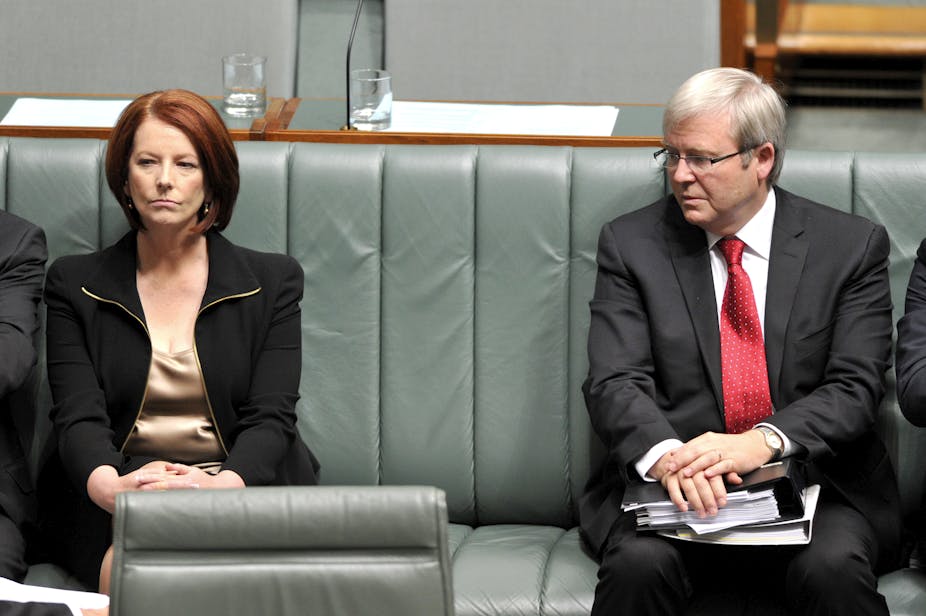The federal Labor caucus has decided to put aside its disdain for former leader Kevin Rudd and return him to the Labor leadership. The reason for this is simple: with Julia Gillard as leader, Labor was heading to a massive electoral defeat in both the House of Representatives and probably the Senate as well.
Kevin Rudd, it seems, is being viewed as the party’s only hope to avert electoral disaster. Here something of interesting transition in caucus’ thinking has occurred reflecting how dire is the party’s situation in the polls.
The last time Rudd was talked about as leader those advocating his return spoke of his ability to win an election. Now the hope is that Rudd can simply avert a disaster.
Questions now arise as to what happens next. Rudd’s return to the prime ministership will be followed by a ministerial re-shuffle. Given the antipathy that exists between Rudd and so many of the current front bench, the change in personnel in the government will be extensive.
There will be many casualties with Wayne Swan, the treasurer under Gillard, arguably being the most senior. Of not unrelated interest will be any change in the new Rudd government’s approach to the policy debate, and here it will be interesting to see if the carbon tax survives.
It will also be interesting to see what happens when the new Rudd leadership subjects itself to a parliamentary session. There might be dangers in Rudd going to the lower house to confront the cross-bench independents, especially if they were to decide to indicate a willingness to support Tony Abbott as prime minister.
In such a situation Rudd would have to tend his resignation to the governor-general and advise her to call on Abbott to form a ministry. Opposition leader Tony Abbott could then go to the next election as prime minister. Clearly there are important constitutional issues associated with the leadership transition and the role of the governor-general could be crucial in determining exactly when the election will be held and who the prime minister will be.
The Liberal-National opposition have been baying for an August 3 election, but that was when Gillard was prime minister. Were Rudd to move to an immediate election the opposition would be denied the opportunity to attack the new government in the parliament.
Rudd would also be hoping to exploit a bounce in support for Labor amongst the electorate that has been hinted at by the opinion polls. Once the election is called Rudd and Abbott would be locked in a policy debate and the controversies associated with the theatre of the parliament – including the contribution of a number of the independents some of whom have decided to retire rather than face their constituents – would be overshadowed. Expect an August election.
The resurrection of Rudd is all about the Labor party being influenced by opinion polls. These polls indicated that Labor MPs holding seats with margins up to 10% could be defeated. This has clearly influenced the thinking of a number of Labor MPs who voted for Gillard in the last leadership ballot.
These polls have been indicating that Labor is in serious trouble in every state except Victoria (but even in that state there have been signs of a corrosion of support especially in seats beyond inner Melbourne). In Queensland, NSW, South Australia and (at least according to Newspoll) Western Australia the collapse in primary support for Labor is at such low levels that, if they were replicated in the Senate, the Coalition would be in with a chance to win control of the upper house.
The critical question now is how the Australian electorate responds to what has happened. For all the drama of the leadership transition, the fact remains that the ALP has done nothing to dispel the notion that it is at war with itself. Labor strategists will be hoping that something of a euphoric response to Rudd’s return translates in to voter support.
The chances are that it will not. As a former Labor leader who was himself the victim of a challenge once put it, you can’t expect people to vote for you to run the country if you can’t run yourself.

